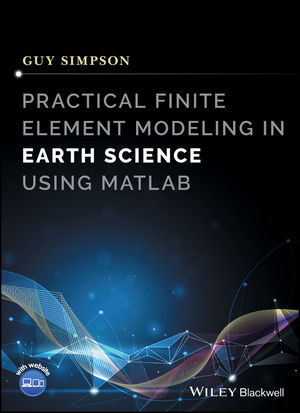
Practical Finite Element Modeling in Earth Science using Matlab
Wiley-Blackwell (Verlag)
978-1-119-24862-0 (ISBN)
- Titel z.Zt. nicht lieferbar
- Versandkostenfrei
- Auch auf Rechnung
- Artikel merken
This book begins with a general introduction to numerical modeling and includes multiple sample Matlab codes to illustrate how FEM is implemented in practice. Textboxes have been included to provide additional detail, such as specialized Matlab usage or advanced topics. Covering all the key aspects, this is essential reading for those looking to master the technique, as well as those simply seeking to increase their basic level of understanding and appreciation of FEM.
Guy Simpson obtained his PhD in Geology from ETH Zurich. He is currently within the Department of Earth Science at the University of Geneva. Over the past decade, he has taught numerous courses at the Universities of Geneva, École Normale Supérieure in Paris, and ETH Zurich on numerical modeling in Earth science using Matlab. He also uses this method in his own research that includes investigation of earthquakes, tectonics and erosion of active mountain ranges, fluid flow, magmatism, and tsunamis.
Preface xiii
Symbols xv
About the Companion Website xvii
Part I The Finite Element Method with Matlab 1
1 Preliminaries 3
1.1 Mathematical Models 3
1.2 Boundary and Initial Conditions 4
1.3 Analytical Solutions 5
1.4 Numerical Solutions 5
1.5 Numerical Solution Methods 7
1.6 Matlab Script 8
1.7 Exercises 10
Suggested Reading 12
2 Beginning with the Finite Element Method 13
2.1 The Governing PDE 13
2.2 Approximating the Continuous Variable 14
2.3 Minimizing the Residual 15
2.4 Evaluating the Element Matrices 17
2.5 Time Discretization 18
2.6 Assembly 19
2.7 Boundary and Initial Conditions 21
2.8 Solution of the Algebraic Equations 21
2.9 Exercises 22
Suggested Reading 23
3 Programming the Finite Element Method in Matlab 25
3.1 Program Structure and Philosophy 25
3.2 Summary of the Problem 25
3.3 Discretized Equations 26
3.4 The Program 27
3.4.1 Preprocessor Stage 27
3.4.2 Solution Stage 29
3.4.3 Postprocessor Stage 30
3.5 Matlab Script 30
3.6 Exercises 33
Suggested Reading 34
4 Numerical Integration and Local Coordinates 35
4.1 Gauss–Legendre Quadrature 36
4.2 Local Coordinates 37
4.3 Evaluating the Integrals 39
4.4 Variable Material Properties 40
4.5 Programming Considerations 41
4.6 Matlab Script 43
4.7 Exercises 45
Suggested Reading 47
5 The Finite Element Method in Two Dimensions 49
5.1 Discretization 50
5.2 Geometry and Nodal Connectivity 52
5.3 Integration of Element Matrices 54
5.4 Multielement Assembly 57
5.5 Boundary Conditions and Solution 60
5.6 Matlab Script 61
5.7 Exercises 65
Suggested Reading 66
6 The Finite Element Method in Three Dimensions 67
6.1 Discretization 67
6.2 Element Integration 69
6.3 Assembly for Multielement Mesh 72
6.4 Boundary Conditions and Solution 73
6.5 Matlab Program 74
6.6 Exercises 79
Suggested Reading 80
7 Generalization of Finite Element Concepts 81
7.1 The FEM for an Elliptic Problem 84
7.2 The FEM for a Hyperbolic Problem 96
7.3 The FEM for Systems of Equations 102
7.4 Exercises 116
Suggested Reading 116
Part II Applications of the Finite Element Method in Earth Science 119
8 Heat Transfer 121
8.1 Conductive Cooling in an Eroding Crust 122
8.2 Conductive Cooling of an Intrusion 126
Suggested Reading 135
9 Landscape Evolution 137
9.1 Evolution of a 1D River Profile 138
9.2 Evolution of a Fluvially Dissected Landscape 143
Suggested Reading 150
10 Fluid Flow in Porous Media 151
10.1 Fluid Flow Around a Fault 152
10.2 Viscous Fingering 157
Suggested Reading 166
11 Lithospheric Flexure 167
11.1 Governing Equations 167
11.2 FEM Discretization 168
11.3 Matlab Implementation 171
Suggested Reading 181
12 Deformation of Earth’s Crust 183
12.1 Governing Equations 183
12.2 Rate Formulation 185
12.3 FEM Discretization 186
12.4 Viscoelastoplasticity 188
12.5 Matlab Implementation 190
Suggested Reading 205
13 Going Further 207
13.1 Optimization 207
13.2 Using Other FEMs 213
13.3 Use of Existing Finite Element Software 215
Appendix A Derivation of the Diffusion Equation 217
Appendix B Basics of Linear Algebra with Matlab 221
Appendix C Comparison between Different Numerical Methods 227
Appendix D Integration by Parts 237
Appendix E Time Discretization 239
References 241
Index 245
| Erscheinungsdatum | 09.04.2017 |
|---|---|
| Verlagsort | Hoboken |
| Sprache | englisch |
| Maße | 193 x 246 mm |
| Gewicht | 771 g |
| Themenwelt | Mathematik / Informatik ► Mathematik ► Algebra |
| Naturwissenschaften ► Geowissenschaften ► Geologie | |
| ISBN-10 | 1-119-24862-0 / 1119248620 |
| ISBN-13 | 978-1-119-24862-0 / 9781119248620 |
| Zustand | Neuware |
| Informationen gemäß Produktsicherheitsverordnung (GPSR) | |
| Haben Sie eine Frage zum Produkt? |
aus dem Bereich


